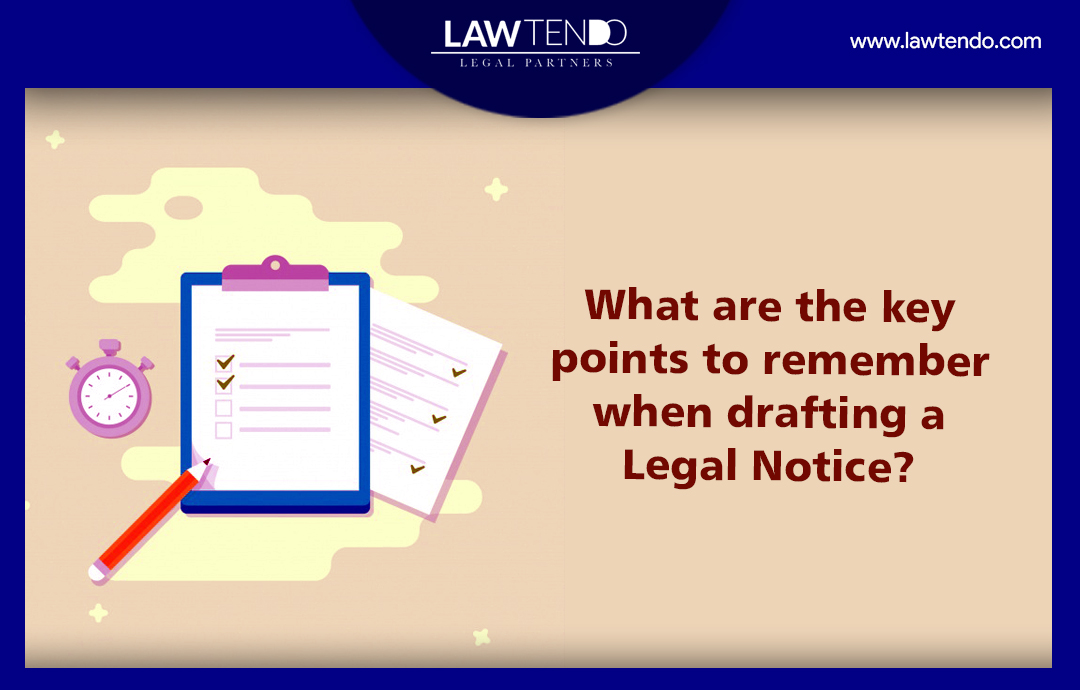What are the key points to remember when drafting a legal notice?

Date : 06 Feb, 2019
Post By admin
What are the
key points to remember when drafting a legal notice?
A “Legal Notice” is a notice indicating your opponent that you
are preparing to litigate a lawsuit against
him in case the so called demand is not fulfilled.
A
Legal notice is a formal written document sent by a person or an entity with
respect to some grievance. It is sent as a warning to the receiver that the one
sending the notice have certain grievances which are not properly taken care of
by the receiver, although the receiver has given enough opportunity to the
receiver to resolve the problem.
In
today’s world we enter into numerous
litigations with individuals/firms wherein filing of civil suit becomes
imperative which we do generally file. Some individuals/firms enters into litigation straightaway
while others opt for serving a notice upon opponent of giving out intention
filing of a civil suit in court of competent
jurisdiction. There are certain legislations which make it mandatory to
file a legal notice before filing any litigation otherwise that litigation
will be bad in law. For eg. The Negotiable
Instruments Act, 1938. It therefore becomes important for us to understand
as to what is meant by Legal Notice which is discussed herein.
There
are several occasions when a person
or an entity needs to take a legal action against another person or an entity.
The several occasions can be consumer
complaint, property dispute, check bounce, divorce, eviction and many more.
However, it is important for you to inform the other person that you are going
to initiate a legal action against them. That is the reason, you send a legal
notice to a person or an entity.
A Legal Notice is generally filed in
civil cases.
In the criminal cases, there is no
filing of the legal notice as in case of a criminal offense the action is
instituted by the State against the person committing the offense as State
is the supreme power. However, if
you intend to initiate a civil suit against the Government you have to serve a legal notice to the Government beforehand and only
thereafter you can file a civil suit against the Government.
Section 80 of The Code of Civil
Procedure, 1908 provides for sending
of a legal notice to the Government or
public officer if one wants to initiate a legal action against them for any
act claimed to be done by such public officer during the course of his official
duty until the expiration of two months. The purpose of the notice is to give Secretary of State or the public officer a chance to reevaluate
his legal position and to offer some
kind of compensation without going to a court
of law.
Some
of the key point which needs to be
kept in mind while drafting a legal notice are as under:
*Address & Title: A legal notice
must contain the complete and correct address of the persons to whom it is
addressed so that it may successfully delivered to them.
Secondly legal notice must contain
proper title such as ‘Legal Notice under
section 138 of Negotiable Instrument Act’, ‘Notice under section 433 of
Companies Act for winding up’.
*Facts: A legal notice must contains
the complete facts of the matter in dispute so that the other party cannot take
plea before the court that same are afterthought and the complete and true
facts are not narrated before the court.
It should clearly spell out the matters which forced the sender to take this
extreme step of issuing legal notice. It states in complete details about the
violations and/or breach committed on the part of the receiver.
*Demand: A legal notice must contain
the details of the demands of the sender of the notice as what he wants from
the receiver of the notice or what he expect the receiver to do or not to do.
Secondly legal notice should mention a reasonable time to be given to the
receiver to comply with the demands of the sender or such time period as may be
specifically prescribed in the statutes
(e.g. N.I. Act etc.), so that the receiver may comply the demands.
Further in a legal notice there must a clear warning be given to the receiver
to the effect that if the demands of the sender are not fulfilled or complied
with then the sender will initiate appropriate legal proceedings against him in
the court of law.
*Consequences: A legal notice must
contain the consequences or action that may follow in case the demands are not
met in time.
Who
can help you with this?
Looking for an experienced lawyer? Look no further. Have a consultation with
some of best lawyers in India with Lawtendo.





